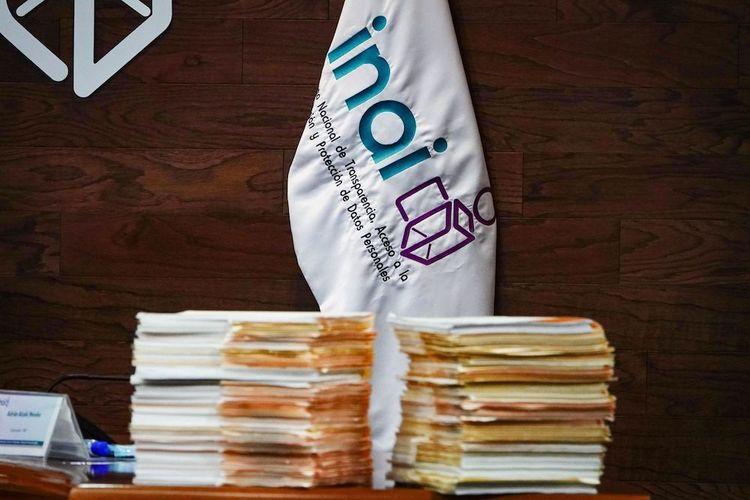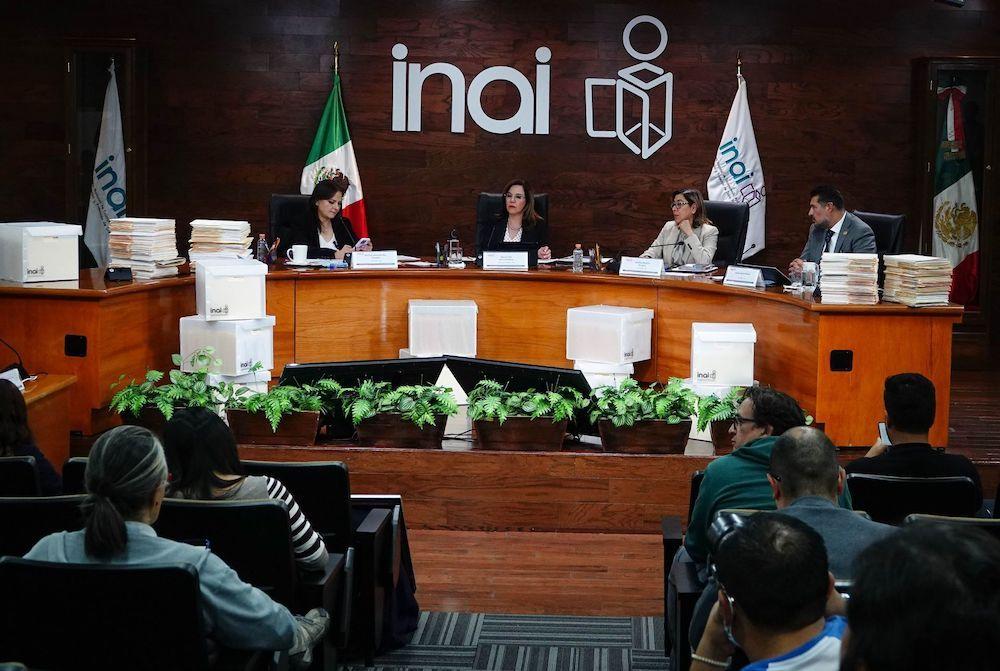The commissioners of the National Institute for Transparency, Access to Information and Protection of Personal Data (INAI) have decided to file a constitutional controversy in the event that the budget allocated by the Chamber of Deputies for 2024 limits the institution's autonomy, said Commissioner Adrián Alcalá.
“It is already a topic that we have discussed, we will defend with everything in our power, and what we are doing is going to the Court with another controversy and having the Court decide if it is fair to cut our budget or not to respect budgetary autonomy,” he said of a possible constitutional controversy if a budget cut occurs in the legislative discussion.
On September 8, the Federation's draft Expenditure Budget was sent as part of the Economic Package for Fiscal Year 2024. The document that will be discussed by legislators foresees 1,168 million pesos for the INAI next year, which is 6% more than this year's budget in real terms.
During this six-year term, the INAI has received several statements from President Andrés Manuel López Obrador and, for the first time in history, the Plenary of the INAI, composed of the commissioners, had to stop its sessions as of April 1 due to the lack of a quorum of the Plenary of this institution, since the Senate did not appoint the commissioners for blockade of the Morena caucus and its allies.
The effect was to pause the resolution of review resources for 151 days. These are disagreements submitted by citizens to the responses provided by various institutions to their requests for information.
In an interview with Causa Natura Media, Alcalá described the challenges of the INAI once the Plenary has been unlocked, noted the actions they will take to ensure the budget and answered statements by President López Obrador that attempt to demerit the institution.

Photo: Rogelio Morales.
— Regarding this review process, how many months (April to August) in which they were unable to sit in session amount to? How long will it take them to deal with that accumulation of resources?
We did not suspend activities at the INAI. We continue to work every day. There was not a single day that the INAI stopped. With this, before we reached the regrettable day of March 30, 2023, when Commissioner Acuña fulfilled his term of office, we issued an agreement to the effect that all remedies and means of challenge should be considered in an ordinary manner.
Only what we suspended was the vote on the decision, but every week, according to the same schedules, the commissioners met and gave our opinions to the draft resolutions, so that there was an early vote, but it was left in private.
— So what happened on the first day of the session?
This allowed us, on the first day we met after the Court's decision..., to formalize before the public, as established by the federal transparency law itself, and to vote for 5,993 means of impeachment.
But in addition to this, we resolved just over 100 complaints for non-compliance with the obligation of transparency and then resolved in full personal data also several procedures for verifying and imposing sanctions for violating the Federal Law on the Protection of Personal Data held by individuals. In other words, we were ready, we voted for them and we don't have any lags.
Only if they accumulated. They can't see the light, why? , because the law says that formally you have to vote for them in public, that's what happened, that's why we're up to date and up to date on a daily basis.
— Following this decision of the Supreme Court of Justice of the Nation so that the commissioners can reconvene, what challenges does the INAI have now?
I think that after this impasse it is a time to reflect and reconfigure ourselves. What do I mean. We realized during this period that we couldn't log in because it was just over 145 days since people don't know the INAI, they don't know the rights. So I think we need to be more sociable, we need to be more penetrating with people, that they know that this right is for everyone and everyone.
— How do you intend to materialize this?
We have a project right now called Open Society, which is a project with university students, where we go to universities or higher education institutions. We will be visiting 53 this year all over the Republic and we are doing a survey. This has allowed us to verify something that we already suspected: that a large percentage of the university population is unaware of the existence of rights, is unaware of the existence of laws, obviously unaware of the existence of institutions such as the INAI, of the bodies that guarantee the National Transparency System... So it's important I think that after the pandemic, we are becoming more socialized about rights. I repeat that people know what is the use of exercising law. Because it is one thing to exercise law and another thing is to give it social utility.
In addition, for the fourth time at the national level, we are implementing what we know as the National Plan for the Socialization of the Right of Access to Information, better known as Plan DAI. This public policy seeks to reach sectors that are normally in a situation of vulnerability, such as migrants, people in situations of deprivation of liberty, perhaps the deaf community, the LGBTTIQ+ community. And in that sense, to the entire population in general so that we first identify problems together and together, we tell them how to make requests for information and then, since they receive the information, so that they can use it in a strategic way. This year we have 28 federal entities that are precisely in addition to this great project, which is this national policy of socialization.
— The new session of the Chamber of Deputies has begun. There is an analysis from the IMCO of how the budget allocated to INAI has been reduced since 2018 and a note that speaks of a possible 30% cut by 2024. Is this the budget outlook for next year? , how does the budgetary issue affect the institution?
What I said in that note is that the coordinator of the Morena parliamentary group, then chief coordinator of the Jucopo (Political Coordination Board) had commented that the Supreme Court or the Judiciary were going to give him a cut of approximately 25 billion pesos, equivalent to 30%. And then he said “and there will also be a cut to autonomous bodies”. So I took as a parameter that statement made by the legislator himself that maybe the self-employed are going to get a 30% cut.
— But is there anything official so far?
Right now we don't have anything. Right after finishing the gist of the presidential report that is this week, we will have to meet to defend the cause. I really trust, despite that statement, that at least they will grant us the current budget; I trust legislators regardless of the Party who are convinced of the need for a guarantor body that can deploy all its powers, and for this reason, public resources are obviously required.
What would happen if there was a significant cut of 30%. Well, that implies that we remake ourselves, practically reinvent ourselves, reorganize ourselves, regroup, but we will comply with all the powers with all the powers established by the legislation in a timely manner. The truth is that we have very committed public servants and we are going to do it. Of course, we will have to reduce this to the best extent possible expenses in certain items. But well, taking advantage of information technologies right now, because obviously we can continue to deploy this type of action outside the institution itself. Obviously, we will continue to ensure that those 26 days can continue to be maintained at that average.
However, regardless of this, we are going to promote or would eventually promote a constitutional controversy to defend the budget, regardless of whether we remake, regroup, organize, get reengineering and get out. We have to go and promote the means of constitutional control so that there is a balance, why? Because we went before the Senate of the Republic in its time to keep and keep the Constitution, we protest this and part of it is in carrying out all the actions that are within our reach to defend autonomy, defend independence and when I refer to autonomy it is not only autonomy in the decisions we make, but also budgetary autonomy.



Comentarios (0)